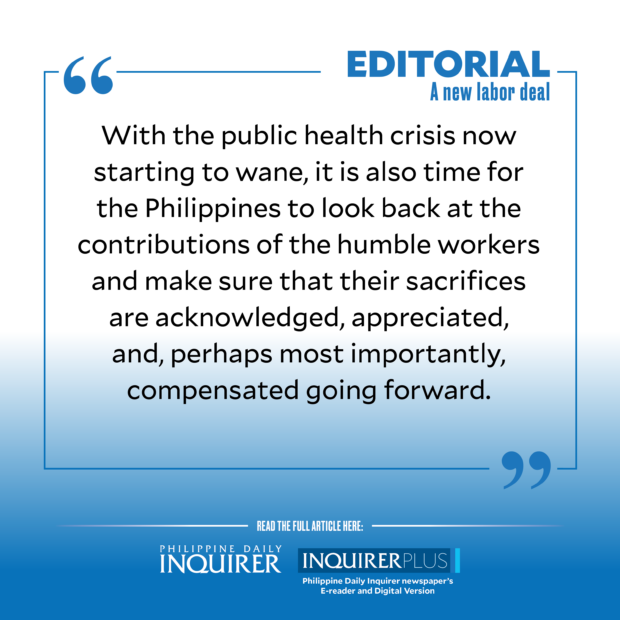With the COVID-19 pandemic all but over, it is time for the Philippines to look forward to the task of rebuilding the battered and bruised nation, especially after it suffered the worst economic contraction since World War II.
Without a doubt, it was the Filipino worker — the health-care professional, the delivery rider, the service industry staff, and the office employee — who kept this country functioning, literally risking life and limb through the darkest days of the crisis to make sure that the rest of us could retain what little normalcy we had in our lives.
With the public health crisis now starting to wane, it is also time for the Philippines to look back at the contributions of the humble workers and make sure that their sacrifices are acknowledged, appreciated, and, perhaps most importantly, compensated going forward.For in a capitalist system such as one that which we live in, there is a very real danger that these people will once more be left behind financially and materially as the surging economy restores what the pandemic took away from those who have already been living comfortably and sufficiently.
As the day of President Marcos’ State of the Nation Address nears, it would be good to hear from the country’s leader a coherent set of actionable plans for improving the state of the most basic building block of our economy — the Filipino workers.
The most pressing issue at hand is that of their living standards which have been eroded over the last couple of years, no thanks to the spike in the inflation rate, caused both by domestic weaknesses like poor logistics as well as global events beyond our control like Russia’s invasion of Ukraine.
To this end, it is important that the Marcos administration redouble its efforts toward bringing the prices of basic goods and services back under control. Much has already been achieved, but much more needs to be done in terms of structural reforms that will make, for example, food more affordable for the common man. We want the President to announce policies that will translate to a lower cost of living both over the long term and in the immediate future.
Speaking of immediate relief, this administration should also support policies that will translate to higher take-home pay for workers, whether it be in the form of a legislated wage hike or giving regional wage boards a nudge — and perhaps the private sector a more forceful push — to be more generous to their employees.
The P150 legislated wage hike being pushed by Senate President Juan Miguel Zubiri is well-intentioned and has its merits. But the downside is that a 26-percent across-the-board increase nationwide will, for sure, fuel inflation and erase whatever benefit workers would have enjoyed just as authorities are already bringing it under control. That is an empirical economic certainty.
In addition, not all companies will be able to afford the proposed P150 across-the-board wage hike. Conglomerates and large corporations can afford it, for sure, but these firms already pay their above-average salaries for the industries they operate in. But mid- to small-sized businesses may not be able to, and many would go under if forced to hike their salaries in one fell swoop.
What Mr. Marcos needs to do is voice his support for the side of labor in the ongoing debates in regional wage boards which determine how much wage hikes will be implemented in various geographic areas of the country depending on how vibrant the local economy is, how much money local firms are making, and how much the cost of living is for the average man on the street for that particular locale. With the President’s backing, these wage hikes should be approved expeditiously. More than that, the wage hikes should be substantial enough as the measly P40 wage increase approved last June for workers in Metro Manila was, in Zubiri’s words, “too little, too late.”
But perhaps the most significant move the President can make for the country’s workers is to commit his administration to ending the long-standing practice of contractualization which has plagued the local labor scene since time immemorial.
Beyond palliative measures, giving our workers the job security that they so dearly deserve would be the best policy his administration could lay down.
Ending the uncertainty that workers suffer every six months once their short-term contracts expire would be one thing a Marcos presidency could be remembered for long after other chief executives have taken the helm of this country.
It is just the right thing to do for Filipino workers and laborers — especially after they saved many businesses and this country from economic ruin at the height of the pandemic.


